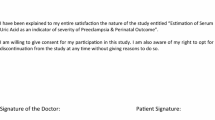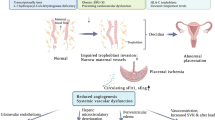Abstract
Introduction
Ischemia and oxidative stress leads to generation of hydroxyl free radicals and modification of ‘N-terminus’ of human serum albumin. This modified albumin molecule, known as Ischemia Modified Albumin (IMA), is elevated in early stages of ischemia. It has recently been approved by US Food and Drug Administration (US FDA) for its clinical use, as early marker of myocardial ischemia in cardiology. IMA is a novel marker of ischemia and is elevated in other clinical conditions associated with ischemia like pulmonary embolism, uncontrolled type II diabetes mellitus, acute decompensated heart failure, preeclampsia, recurrent pregnancy losses and IUGR. Role of IMA in birth asphyxia in perinatology is of current interest and needs further research.
Methodology
A prospective case control study was conducted in a tertiary center in North India for one year. Total 80 pregnant women between 34 and 40 weeks were recruited and allocated in two groups. Case group comprised of 40 pre-eclamptic pregnant women and control group comprised of 40 normotensive pregnant women. Comparison and association of maternal serum IMA levels with fetomaternal outcome and number and types of placental histopathological changes was done in two groups.
Results
In preeclampsia group mean serum IMA (115.23 ± 49.51) was significantly higher as compared to the normotensive group (79.21 ± 14.35). The optimum cut off value of IMA to detect a case was 94.5 IU/ml (sensitivity 65%, specificity 87.5%, PPV 83.9%, NPV 71.4% and diagnostic accuracy of 76.3). Pre-eclamptic women, had significantly higher incidence of PTVD, lower fetal birth weight and placental histopathological changes as compared to normotensive group. 83.8% of the women with raised IMA levels were pre-eclamptic. Raised IMA levels were significantly associated with higher incidence of PTVD, birth weight ≤ 2 kg and hypoxic histopathological lesions of chorangiosis, intervillous fibrin and hyalinization.
Conclusion
Determination of maternal serum IMA levels early in pregnancy can predict preeclampsia and avoid future severe preeclampsia related complications. It might be useful to optimize both maternal and fetal/neonatal outcomes.





Similar content being viewed by others
References
Oran I, Oran B. Ischemia-modified albumin as a marker of acute coronary syndrome: the case for revising the concept of “N-Terminal Modification to Fatty Acid Occupation” of albumin. Dis Markers. 2017;2017:5692583.
Gaze DC. Ischemia modified albumin: a novel biomarker for the detection of cardiac ischemia. Drug Metab Pharmacokinet. 2009;24(4):333–41.
Anwaruddin S, Januzzi JL Jr, Baggish AL, Lewandrowski EL, Lewandrowski KB. Ischemia-modified albumin improves the usefulness of standard cardiac biomarkers for the diagnosis of myocardial ischemia in the emergency department setting. Am J Clin Pathol. 2005;123(1):140–5.
Marrocco I, Altieri F, Peluso I. Measurement and clinical significance of biomarkers of oxidative stress in humans. Oxid Med Cell Longev. 2017;2017:6501046.
Gunduz A, Turedi S, Mentese A, Altunayoglu V, Turan I, Karahan SC, Topbas M, Aydin M, Eraydin I, Akcan B. Ischemia-modified albumin levels in cerebrovascular accidents. Am J Emerg Med. 2008;26(8):874–8.
Guven S, Alver A, Mentese A, Ilhan FC, Calapoglu M, Unsal MA. The novel ischemia marker ‘ischemia-modified albumin’ is increased in normal pregnancies. Acta Obstet Gynecol Scand. 2009;88(4):479–82.
Raijmakers MT, Roes EM, Poston L, Steegers EA, Peters WH. The transient increase of oxidative stress during normal pregnancy is higher and persists after delivery in women with pre-eclampsia. Eur J Obstet Gynecol Reprod Biol. 2008;138:3944.
Papageorghiou AT, Prefumo F, Leslie K, Gaze DC, Collinson PO, Thilaganathan B. Defective endovascular trophoblast invasion in the first trimester is associated with increased maternal serum ischemia-modified albumin. Hum Reprod. 2008;23:803–6.
Üstün Y, Engin-Üstün Y, Öztürk Ö, Alanbay I, Yaman H. Ischemia-modified albumin as an oxidative stress marker in preeclampsia. J Matern Fetal Neonatal Med. 2011;24(3):418–21.
Stanek J. Hypoxic patterns of placental injury: a review. Arch Pathol Lab Med. 2013;137(5):706–20.
Yarcı Gursoy A, Caglar GS, Demirtas S. Ischemia modified albumin in perinatology. Eur J Obstet Gynecol Reprod Biol. 2017;210:182–8.
Roy N, Sahana Y. Serum ischemia modified albumin as a potent biochemical marker in pre-eclampsia patients attending a tertiary care hospital in central India. Int J Clin Biochem Res. 2019;6(2):209–12.
Van Rijn BB, Franx A, Sikkema JM, van Rijn HJ, Bruinse HW, Voorbij HA. Ischemia modified albumin in normal pregnancy and preeclampsia. Hypertens Pregnancy. 2008;27(2):159–67.
Karaşin SS, Çift T. The role of ischemia-modified albumin as a biomarker in preeclampsia. Rev Bras Ginecol Obstet. 2020;42(3):133–9.
Pijnenborg R, Vercruysse L, Hanssens M. The uterine spiral arteries in human pregnancy: facts and controversies. Placenta. 2006;27:939–58.
Dekker GA, Sibai BM. Etiology and pathogenesis of pre-eclampsia: current concepts. Am J Obstet Gynecol. 1998;179:1359–75.
Jena I, Nayak SR, Behera S, et al. Evaluation of ischemia-modified albumin, oxidative stress, and antioxidant status in acute ischemic stroke patients. J Nat Sci Biol Med. 2017;8(1):110–3.
Aouache R, Biquard L, Vaiman D, Miralles F. Oxidative stress in preeclampsia and placental diseases. Int J Mol Sci. 2018;19(5):1496.
Duley L. The global impact of pre-eclampsia and eclampsia. Semin Perinatol. 2009;33:130–7.
Grill S, Rusterholz C, Zanetti-Dällenbach R, et al. Potential markers of preeclampsia—a review. Reprod Biol Endocrinol. 2009;7:70.
Bahinipati J, Mohapatra PC, Pradhan T. Role of maternal serum ischemia modified albumin as a biochemical marker in preeclampsia. Biomed Res. 2014;25(2):153–6.
Vyakaranam S, Bhongir AV, Patlolla D, Chintapally R. Maternal serum ischemia modified albumin as a marker for hypertensive disorders of pregnancy: a pilot study. Int J Reprod Contracept Obstet Gynecol. 2015;4(3):611–6.
Roberts JM, Escudero C. The placenta in preeclampsia. Pregnancy Hypertens. 2012;2(2):72–83. https://doi.org/10.1016/j.preghy.2012.01.001.
Vafaei H, Karimi Z, Akbarzadeh-Jahromi M, Asadian F. Association of placental chorangiosis with pregnancy complication and prenatal outcome: a case-control study. BMC Pregnancy Childbirth. 2021;21(1):99.
Loukeris K, Sela R, Baergen RN. Syncytial knots as a reflection of placental maturity: reference values for 20 to 40 weeks’ gestational age. Pediatr Dev Pathol. 2010;13(4):305–9. https://doi.org/10.2350/09-08-0692-OA.1 (PMID: 20017638).
Majumdar S, Dasgupta H, Bhattacharya A. A study on placenta in normal and hypertensive pregnancies. J Anat Soc India. 2005;54:34–8.
Kambale T, Iqbal B, Ramraje S, Swaimul K, Salve S. Placental morphology and fetal implications in pregnancies complicated by pregnancy-induced hypertension. Med J DY Patil Univ. 2016;9:341–7.
Salmani D, Purushothaman S, Somashekara SC, et al. Study of structural changes in placenta in pregnancy-induced hypertension. J Nat Sci Biol Med. 2014;5(2):352–5. https://doi.org/10.4103/0976-9668.136182.
Rossi A, Romanello I. Ischemia-modified albumin in pregnancy. Am J Obstet Gynecol. 2017;27:159.
Kiseli M, Gürsoy AY, Akincioglu E, Çağlar GS, Çandar T, Demirtaş S. The association between ischemia modified albumin and placental histopathology in uncomplicated term deliveries. Placenta. 2015;36(9):1056–8.
Author information
Authors and Affiliations
Corresponding author
Ethics declarations
Conflict of interest
The authors declare that they have no conflict of interest.
Ethical Approval
Ethical approval from institutional Ethical Committee KGMU, Lucknow, was taken.
Informed Consent
Informed consent was obtained from all individual participants included in the study.
Additional information
Publisher's Note
Springer Nature remains neutral with regard to jurisdictional claims in published maps and institutional affiliations.
Dr. S. P. Jaiswar is Professor at Department of Obstetrics and Gynaecology, King George Medical University, Lucknow, India; Dr. Shikha Verma is Senior Resident at Department of Obstetrics and Gynaecology, King George Medical University, Lucknow, India; Dr. Monica Agrawal is Associate Professor at Department of Obstetrics and Gynaecology, King George Medical University, Lucknow, India; Dr. Sujata Deo is Professor at Department of Obstetrics and Gynaecology, King George Medical University, Lucknow, India; Dr. Madhumati Goel is Professor at Department of Pathology, King George Medical University, Lucknow, India; Dr. Abbas Ali Mahdi is Professor & Head at Department of Biochemistry, King George Medical University, Lucknow, India.
Rights and permissions
About this article
Cite this article
Jaiswar, S.P., Verma, S., Agrawal, M. et al. Association of Maternal Serum Ischemia Modified Albumin (IMA) with Placental Histopathological Changes and Fetomaternal Outcome: A Prospective Case Control Study in Normotensive and Pre-eclamptic Women. J Obstet Gynecol India 72 (Suppl 1), 166–173 (2022). https://doi.org/10.1007/s13224-021-01614-7
Received:
Accepted:
Published:
Issue Date:
DOI: https://doi.org/10.1007/s13224-021-01614-7




